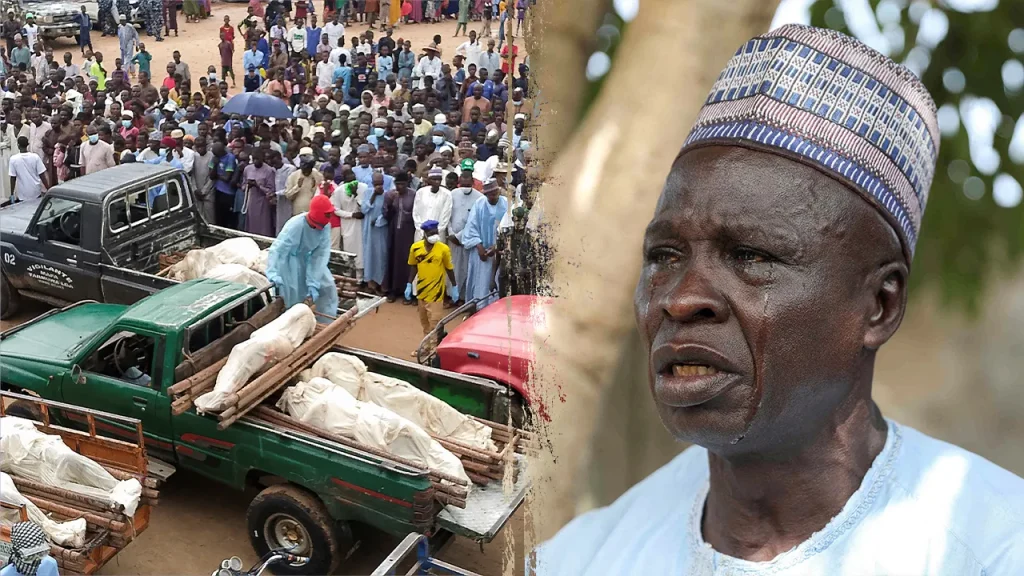U.S. Considers Strong Response to Christian Persecution in Nigeria
In a significant shift in U.S. foreign policy, Republican Representative Riley Moore has outlined potential American responses to what he describes as the “genocide” of Christians in Nigeria. As one of the officials designated by former President Trump to lead an investigation into religious violence in the African nation, Moore’s comments highlight the growing concern in Washington over the persecution of Christians by Islamist militants. The situation has garnered heightened attention after Trump designated Nigeria as a “country of particular concern” and directed the Pentagon to prepare for possible military intervention. The former president made his position clear in a video message, warning that the U.S. might “do things to Nigeria that Nigeria is not going to be happy about” and potentially “go into that now-disgraced country guns-a-blazing” if the situation doesn’t improve.
The designation of Nigeria as a country of particular concern provides the U.S. government with what Moore describes as “15 different levers” for response. These options range from halting arms sales and freezing aid to imposing sanctions on Nigerian officials or institutions accused of enabling or ignoring religious violence. In a striking statement, Moore told Fox News Digital that “all options are on the table here for this, even kinetic military action,” suggesting that targeted counterterrorism operations against militant leadership could be considered if necessary to stop the killings. The West Virginia Republican expressed frustration that despite billions in U.S. security assistance provided to Nigeria since 2009, the Nigerian government has not prioritized protecting religious minorities. Moore is currently working with the House Appropriations Committee and State Department to identify legislative measures that could support a strong administrative response, while also consulting with NGOs and Christian organizations in Nigeria to document the scale of violence.
The situation in Nigeria is complex and deeply concerning, with Moore describing the attacks as a “genocide” in which Christians are being killed at a rate five times higher than non-Christians. He accused Nigeria’s government of indifference, citing a tragic incident where a pastor warned authorities about an imminent attack, only to be dismissed—before he and twenty congregants were murdered within 24 hours. The Nigerian government strongly rejects these characterizations, arguing that portraying the country’s security challenges as a targeted campaign against Christians is a “gross misrepresentation of reality.” Nigerian officials maintain that terrorists attack all who reject extremist ideology, regardless of faith. Despite these disagreements, Moore and Representative Tom Cole plan to meet with Nigerian officials in Washington this month as part of their investigation and may even send delegations to Nigeria for first-hand assessment of the situation.
Moore emphasized that the U.S. approach isn’t entirely punitive, noting that “it’s not all sticks here – there are some carrots in this.” If Nigerian authorities demonstrate willingness to work with the United States in confronting extremist groups, Moore believes it could lead to a stronger bilateral relationship. Nigeria’s demographic complexity adds layers to this crisis—with over 230 million people speaking more than 500 languages and practicing diverse faiths including Islam, Christianity, and indigenous traditions. The country’s religious communities are geographically divided, with Muslims predominant in the north and Christians concentrated in the south. Christianity established deep roots in the 19th century when freed slaves educated in Sierra Leone returned as teachers and missionaries, founding schools and churches that continue to shape southern Nigeria’s cultural identity today.
The religious violence occurs against a backdrop of economic disparity and strategic importance. Despite Nigeria’s vast oil and mineral wealth, decades of corruption have left much of the population impoverished. The country’s growing reserves of lithium, cobalt, nickel, and other rare minerals have attracted U.S. interest as Washington seeks to counter China’s dominance in Africa’s critical minerals market. Both the Commerce Department and U.S. International Development Finance Corporation have explored investment opportunities in Nigeria’s emerging lithium industry, but persistent insecurity in mining regions threatens Western access and future development. These economic considerations add another dimension to U.S. policy calculations regarding Nigeria’s internal conflicts.
For more than a decade, Christians fleeing northern Nigeria have endured brutal violence from Boko Haram, an Islamist militant group notorious for terroristic attacks. The International Society for Civil Liberties and Rule of Law reports devastating statistics: at least 52,000 Christians killed, approximately 18,500 abducted and presumed dead, and 20,000 churches and Christian schools attacked between 2009 and 2023. Boko Haram gained international notoriety in 2014 with the kidnapping of 276 schoolgirls, and continues to employ children as suicide bombers while operating slave markets in territories under its control. Despite these atrocities and Moore’s suggestion of possible military action, defense officials indicate that direct U.S. military intervention would be challenging given limited American assets in the region. The United States maintains no permanent military base in Nigeria, though small teams of advisors and special operations trainers work periodically with Nigerian forces through U.S. Africa Command programs. With approximately $600 million in security aid provided to Nigeria over the past decade—primarily focused on counterterrorism in the northeast—the question remains whether diplomatic pressure, economic sanctions, or limited military cooperation will be sufficient to address what Moore and others characterize as an ongoing genocide against Nigeria’s Christian communities.


